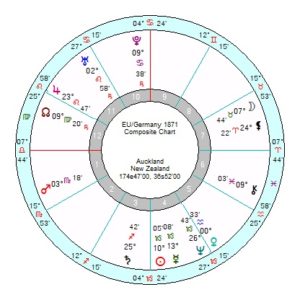Angela Merkel has survived to fight on, reaching an agreement on an immigration deal that almost blew her fragile new coalition government apart. Her 4th term chart, 14 March 2018 12.02pm, is buoyed up by Jupiter so likely to slide through most hiccups and it didn’t show any indications of a cataclysmic meltdown now. But she’s got more problems on her plate than migrants with the German economy giving signs of heading for a recession. Retail sales and industrial production are down, the auto businesses will be hard hit by Trump tariffs, the banks are not looking robust and the huge German trade surplus won’t protect the country if debtors fail or there is a global crash. (NB Trump may be unwise to launch a full-scale trade war but he’s not wrong about EU protectionism which lands a 10% tariff on US cars imported, while US has only a 2.5% tariff on EU cars.) For all its image as the Rolls-Royce of Europe, German is ill-prepared for the 21st Century, lagging badly on technology and infrastructure.
Merkel’s own chart has a ‘shocking collision’ Solar Arc Sun square her Mars, exactly in four months; and before then the July Cancer Solar Eclipse will conjunct her 8th house Sun Uranus which will bring more crises than usual in the months thereafter. 2019 does look like meltdown time despite Jupiter moving through her 1st. It’ll only give her a temporary lift as tr Pluto makes a disastrous and confusing square to her 10th house Neptune plus a tumultuous opposition to her Uranus from April onwards for two years. Followed in late 2019 by a total-failure Solar Arc Neptune conjunct her Mars. Plus she has tr Saturn wading through the nadir of her 1st quadrant in her 2nd house for some years, – banana skins, misjudgements, lower energy, less success, lost her mojo.
The Bundesbank (central bank) chart, 26 July 1957, also indicates 2019/2020 as hugely disruptive with tr Uranus square Sun and Uranus, leading to devastation in late 2020/early 2021 with Solar Arc Pluto conjunct Neptune. Even before then. this year into mid 2019, it’s on a knife edge with tr Uranus opposition Neptune, trine Pluto and Venus.
The Germany chart, 1 January 1871 12 am, has this July’s Solar Eclipse conjunct the 10th house Uranus for a forced rethink about direction. With the next two year’s Eclipses colliding with the 4th house Germany Venus, the Sun, and then Saturn – so a rolling phase of challenges, crises and hard choices. Plus tr Neptune starts to square the Germany Jupiter from May 2019 onwards into 2020 which is financial bubble-bursting time and will lower confidence sharply. And tr Uranus is conjunct the Germany Taurus Moon on the cusp of the 8th from June 2019 onwards into 2020, which will bring economic shocks. Tr Uranus then rolls through the Germany 8th house of business finances for seven years – as it does in the EU and UK charts.
All of the above coinciding with an explosive three years in the relationship between the EU and Germany up to early 2021, starting this year as tr Uranus shakes up the composite Grand Cross of Venus, Uranus Mars and Moon; plus a separating tr Saturn square Pluto this year and then Sun Mercury across the New Year. Germany is very tied into the EU with a 10th house Pluto opposition Sun but that will be tested to the limits, especially with tr Pluto and then tr Saturn squaring the Germany 7th house Neptune causing it to question its commitment to close relationships.




Interesting read and some good points on all sides. For my part, I work in digital tech. I take on board the criticisms of social media, that part of digitisation has brought some very undesirable effects, but that is only one aspect. Whether you like it or not, today it’s digital tech that keeps those manufactured goods moving. The world has changed just like it did after the industrial revolution, good luck putting that genie back in the bottle.
As for anti-german anglophone media, I think that works both ways; don’t presume that every British person is a knuckle dragging Sun reader. In fact, Germany has always had a good business reputation in the UK (I can’t speak for the US, but I imagine it’s similar). It was a big surprise to me when I first started working with German partners on digital projects how low their standards were with digital, I was expecting highly efficient perfectionists. I would have to watch and QA everything they did on behalf of our clients. On one memorable occasion, I’d sent one German partner over something on behalf of a large New York agency which was full of coding errors and looked awful. I called them up to urgently fix it before the client sees it as this worth hundreds of thousands and if I were them I’d ask for my money back. Instead of getting straight on it, they started chasing me for a £3.12 credit note. I also found a lack of initiative with creative problem solving that I didn’t encounter in France or Britain. I would never even bother to QA work from Paris because I knew it would be perfect. I would chase them (often) for being late or over complicated things, but their work was of a very high standard.
My Scandinavian ex-boss said to me on leaving the department that it was always the way. If they needed something to be completed exactly on time, with OK quality (cheap), they’d ask the Germans to do it. If they needed something that would amaze people with it’s quality, but doesn’t matter if it’s (very) late (and expensive), they’d ask the French. If they needed something that was very good quality and on time, as a one off, they’d ask the UK office. I thought at the time that this roughly equates like Cardinal/Fixed/Mutable (though the UK chart isn’t that mutable, the workforce is definitely more flexible from my experience). Britain may not be one of the big cogs in the manufacturing machine any more, but it is a big component of the oil that keeps it moving. What I fear from Brexit and the Trump tariffs is gridlock, we are really all much more dependent on each other than we appreciate.
Tara, Thanks. I would tend to buy German for quality of manufacture – cars/household goods. But I do find French websites fairly abominable. Even the big international ones seem to lose their ease of use when the French get hold of them. They are improving but they always want to put their own stamp on them which is usually not an improvement. And you never want to put Orange/France Telecom software anywhere near your pc.
Italian websites are always sumptuously beautiful but like local French ones have an aversion to listing prices which is v off putting.
I’ve always respected the German work ethic being a Calvinist Scot so I’m as surprised as anyone about where they are at.
Thankfully the projects I was talking about were of short duration, microsites and the like, but I’d be tearing my hair out when they were late! I have to say though, all of the French offices did do some beautiful work (when it did arrive).
There is definitely a French tendency to over complicate things. They also have a love of overloading their pages with tracking tags and analytics, which slows everything down. However a lot of big corporations around the world are heavily reducing how much they spend on things like websites, IT systems and customer care – gradual effect of shareholder pressure and bottom line profits. Lots of dev work on corporate sites is outsourced to Eastern Europe and South Africa, so people working on one “digital product” might be thousands of miles apart. Some are better at managing this than others.
I was once offered Orange (UK) broadband as a corporate freebie. I politely declined 😉
(wanted to break the comment up because it’s a point on the first article)
The article on physical infrastructure (not fiber backbone) states a common issue amongst all old developed nations – repairing old roads bridges etc. China is the only nation which is investing actively in infrastructure.
(I apologise for the following as I realise this is an astro website but the articles raised an interesting issue on economics and growth, which in the context of this thread and your response to Solaia made sense to post)
I read these articles – all three articles start from an erroneous hypothesis – that digitization is inherently desirable.
1. Having the big four has not benefited the US as much because they continue to avoid paying tax commensurate with their value, and their employees are dominated by foreign citizens. This does not necessarily contribute to economic growth, and more importantly does not increase economic equality. As to the platform that they might provide to other people to enhance productivity see 2 and 3 below
2. Extreme digitization, and the idea that all digitization is good – has led to a flurry of frivolous startups, and a move away from traditional manufacturing which is the main complaint the Trumpers have. This is why the tarriffs have been imposed to provide an impetus to manufacturing.
On the one hand we are saying the US has over emphasis on digitization and lack of traditional manufacturing providing employment. On the other hand we are blaming Germany for emphasizing industries that create tangible (and necessary) consumer products. Traditional manufacturing, not digitization, creates jobs in country for it’s own citizens. The digitization industry itself usually creates jobs outside the nation (as most engineering degree holders are Asian), the smaller firms are unable to generate large scale long term and stable employment (in silicon valley as well, just take a cursory look at San Francisco). Digitization should assist traditional manufacturing (instead of replacing it as in the US). So the only nation Germany lags is China (as the latter is the only one which has struck a balance between the two.
4. Unrelated : An overemphasis in connectedness (a product of extreme and unregulated digitization), has led to a complete breakdown of the information infrastructure in the US, giving us the mighty orange. (Even the Reuters article talks about the dangers of unfettered data and consequent misuse by vested interests)
It will always make sense to small island nations like the Republic of Ireland, with few natural resources and a well educated population to have a digital industry emphasis. Of course, we need to solve the problem of the big tech corporations using small European countries like this to exploit the tax system. However, I think these countries would look at Germany and say “Well, what else are we supposed to do?”. In the US it does seem to have created a more social divide between the rust belt and the coastal tech/financial centres.
Most manufacturing in Europe seems to be luxury goods rather than affordable every day necessities, we just don’t have the resources and land masses of the USA, Russia, China and even Australia. You might say Germany is more reliant on digital media and rich foreigners to shift it’s luxury cars and consumer goods. I have seen an awful lot of German marketing cash flow to Moscow and London. Funnily enough I have just bought a new Bosch oven (with my digital earnings, Britons do love irony after all) I have since read that while 92 Bosch products are made in Germany, 119 are made in just China alone. Are they selling their goods or are they selling their brand?
Pluto in Aquarius is going to bring some sort of shift with these coastal areas and smaller fringe European countries (UK included!), as these areas suggest Aquarian energy to me. Aquarius brings an emphasis to the edges of things and sometimes a “hollowing out”. I am already noticing this on the ground in the UK with regards to London, although it’s not a huge topic in the media – yet.
https://www.cnbc.com/2016/09/14/germany-has-a-crumbling-infrastructure-problem.html
Europe’s most powerful economy, at the forefront of industrial innovation for decades, is struggling to adapt to the digital age, and its policymakers are worried.
https://www.reuters.com/article/us-germany-digital-gap/special-report-rebooting-germany-where-europes-most-powerful-economy-is-falling-behind-idUSKBN1JL0YT
Although the German economy remains strong, it is living off the success of its past. Its strength lies in its constant ability to improve products and technologies, to build the best cars and the best machines. For a long time, this has allowed it to conceal the fact that it lacks a fundamental trait: innovative strength, or the ability to create entirely new things, new technologies, new products and new business models.
http://www.spiegel.de/international/business/germany-tries-to-catch-up-with-startup-world-a-1140130.html
“For all its image as the Rolls-Royce of Europe, German is ill-prepared for the 21stCentury, lagging badly on technology and infrastructure.”
I’d really want to know your source for this assertion, because this is NOT what happens according to what I see (been on commercial side of tech most my working life) and I’ve read on IT & Engineering Industry Reports.
Germany STILL has an edge in Engineering in Europe, coming fourth in World for patent applications both compared to GDP and population. The only countries topping them in patent applications per GPD are in Asia. Switzerland comes before them in per capita applications, which is to be expected, since they have significant farmaseutic sector. And why are patents important when trade wars hit? Because patents typically cover high added value products people and companies need so badly they are willing to pay tariffs (for instance, even a 10 per cent tariff is not bad for a car costing 20 000 euros to the consumer, if the car has technology covered by patents that makes up the difference over the years).
Not only that, Berlin has established itself as the main European hub for tech startups. Stockholm and Helsinki may top quaries for “startup friendliest”, but when it comes to successfully scaling your company, Berlin is a great place since you immediately have an access to tens of millions of people within a 6 hour drive and less than a hour of flight.
Also, I don’t know what’s the benchmark for “failing” infrastructure here. Everything that isn’t built-to-a-field China-new, I suppose, because in my experience, most things are new by European standards in Germany. For instanse, Munich Airport went through an impressive renovation some 15 years ago, and is now preferred by most logistic companies for a reason.
So, who ever sold you this idea of Germany being “ill equipped” for 21st Century, should be the very least horrified of what’s going to happen to the rest of Europe – and yes, this includes The UK – and The US counting out Northern California, because most countries/areas here are incredibly much worse off than Germany on this respect.
Do feel free to re-interpret the astrology. It’s why I put in astro-detail. Otherwise come back to me in a year’s time.
I’m not contesting astrology here, if not for use of that 1871 chart. But if your premises for interpreting the data are flawed, there’s also a chance for faulty interpretation.
It’s obvious Germany is in “crisis” right now. But even now, German “crisis” somehow looks a bit different from Italian crisis, doesn’t it? Just as not much of what you projected for Nordic Countries in March 2017 has materialized.
It’s good to remember that even with Merkel gone, Germany would STILL be ruled by CDU, and be very pro-EU and pro-euro. The biggest difference would be in migrant policies. They’d probably look more like Austrian or Danish policies – with some sort of limitation for new arrivals outside EU and forced integration. Not saying I personally agree with this direction, but over all, this won’t affect economy.
And, even with a full fledged financial crisis (not likely to hit EU the hardest, with most banks now operating in City relocating either to Luxembourg or Frankfurt and new banking regulation actually on the way in EU), Germany would not go full-Greece for various reasons.
As the only sane democracy left with any degree of economic power, I would imagine you’d try and see some silver lining up this some serious ax grinding.
Good god lady! What did Germany or Merkel do to you? I don’t think I’ve seen so many consistently negative posts on a nation. Even ole Puts gets a break from you.
It’s decades of Brittish media trashing EU and Germany, really, that gets even the best of Anglophones.
I’ve said it previously, but one should be able to scale bad astrological transits to the situation. Germany is in much better shape than, let’s say, The UK, to fair coming crisis. They actually have a functioning, competitive manufacturing sector. They are leaders in Innovation Industry, which means that no matter how high the tariffs rise, they will have an edge, because they offer goods people need.
Putin doesn’t get a break from me personally. It’s what the astrology says. I may not like it but like GWB he’ll slide through where he doesn’t deserve to – up to a point.